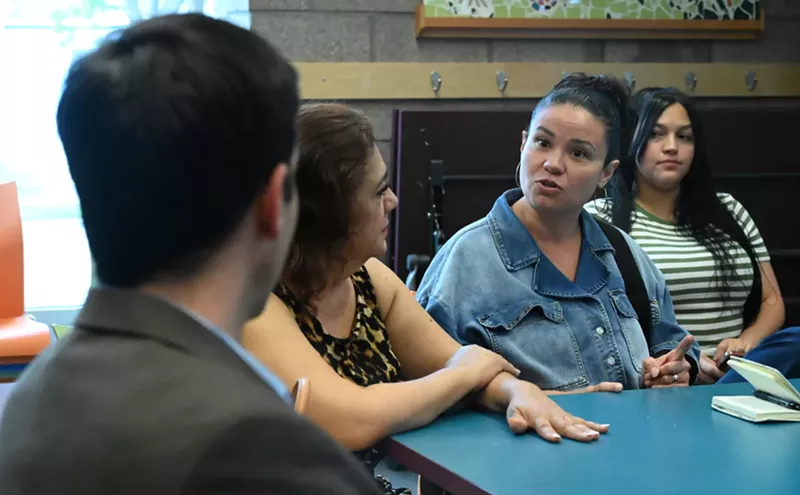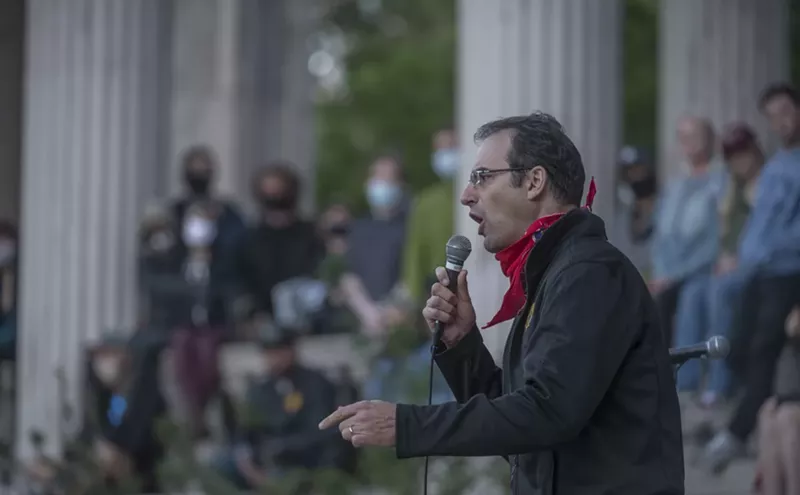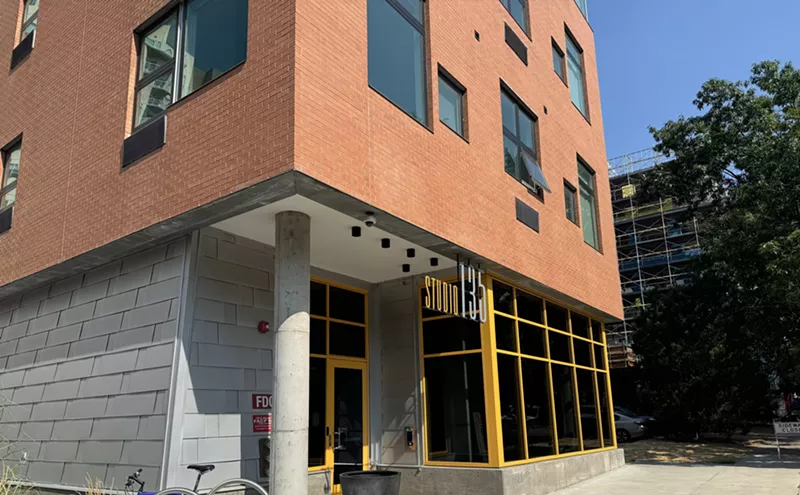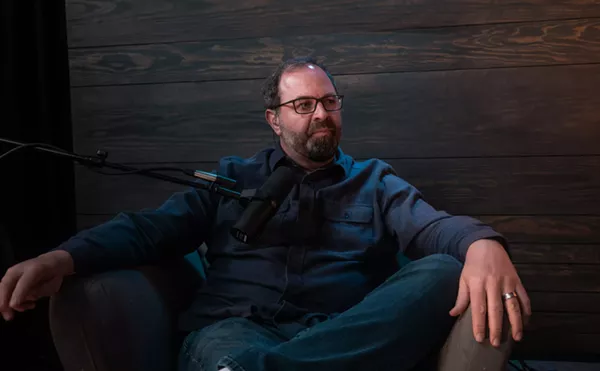Greg Schreier, the Press's outgoing managing editor, seconds that emotion. In his words, "It's made me fully understand the phrase 'Trust no one.'"
"I'm sad that everyone got upset," counters former Denver Post national editor Michelle P. Fulcher, a CU instructor and Press advisor who is also moving on. "But I hope that, as painful as the lessons are and were, they gained something."
Over its 25-year-plus lifespan, the Press has helped ready a generation of would-be reporters for newspaper careers. But in recent years, according to Paul Voakes, the dean of CU's School of Journalism and Mass Communication, the Press hasn't been a must-read among members of the student body. "On average, we printed 7,000 copies per issue," he says, "and each week, we were looking at roughly 5,000 of those coming back to the recycling center."
Publishing expenses were becoming a challenge, too. For the past several years, the Colorado Daily, which had been CU's student paper before declaring its independence three-plus decades ago, printed and distributed the Press at cost. Unfortunately, this bargain ended shortly after the Daily was purchased by E.W. Scripps, the parent company of the Camera and the Rocky Mountain News. "We would have had to pay a significantly larger amount of money for them to keep printing us," Fulcher says.
In the meantime, Voakes was wrestling with another dilemma. "We're the only Big 12 university with an accredited journalism facility that hasn't had a daily newspaper since 1972," he reveals. That was unacceptable, in his opinion, but he knew that in these tight budgetary times, he'd never be able to cobble together enough money to print the Press more frequently. Then, he says, "the lightbulb finally went on. The answer to how we could economically enable students to produce daily news was to put it online."
Press editor Clary understands the reasons for this transition and thinks it will work out well in the long run. However, she objects to having been left out of the loop. For instance, she says no one told her about the situation with the Daily; she only found out after phoning the paper herself. "They said, 'It's our understanding that after a certain time, we aren't going to print you guys anymore,'" she recalls. "And I was like, 'O-kay...'" And while she'd heard about a possible move from print to online, she didn't know it would go into effect at the beginning of the fall semester until May, days after she and Schreier had designed and named a staff of about twenty for a weekly publication schedule. "We had to spend a lot of our summer restructuring everything," Clary allows. "The word we constantly used was 'blindsided.'"
Fulcher thinks that's an exaggeration. As she points out, "It's not like we walked in on the 24th of August and said, 'Tomorrow we're going to be a daily. Whoops!' Everybody would have liked more planning time, but life happens -- and it's not always comfortable for people."
The printed Press was supposed to die prior to the summer, but Clary and Schreier convinced Fulcher and company to let them circulate a welcome-back newspaper in August to announce that www.thecampuspress.com would soon be the only place to find the publication. They also tried to hype this change with promotional items emblazoned with the Press moniker -- but when the person in charge of the effort asked for funding to purchase more giveaways, Clary says, "He was told that no more money was going to be put into products with Campus Press on it, because the name was going to change. And that blindsided us again."
Voakes pleads guilty to this charge. The Press's electronic modification provided a great opportunity for advertising students "to devise a campaign, soup to nuts, for the launch of a product," he says. Hence, everything was on the table, including the name, which he saw as both "fairly generic" and "archaic," since a physical press wasn't part of the process anymore.
To Schreier, though, jettisoning this handle "seemed to completely nullify the whole history of the paper." That view was expressed in an October 18 Press editorial that declared, "Our instincts are what make us qualified editors, yet when our instincts tell us what the school is pushing us toward is not right -- we aren't heard. We're ignored. The changes go on, our concerns get misconstrued as being the result of sensitivity and we continue to grow more unhappy with our lack of control."
Once Press staffers went public with their disapproval, the prospect of a new appellation was dropped. "It was a lightning bolt that went over very poorly," Voakes says, "and I blame myself for that." There's been no open warfare since then, but tension remained -- although it's dissipated of late due to impending turnover. Fulcher recently informed her students that she'll be leaving the university to take a production position at Colorado Matters, Colorado Public Radio's signature program; her departure was motivated by the great job, she emphasizes, and not Press-related frustration. (The publication's new overseer will be Sandra Fish, a journalism instructor who also advises the blog Colorado Confidential.) Moreover, Schreier and Clary are among a number of staffers who've decided not to return in 2007. As a result, this year's final issue, scheduled for December 15, will mark their Press swan song -- and Clary is more than ready for it. "I think a good majority of us are burned out," she maintains.
Even so, both editors will take away positives from their time at the Press. "I still love journalism," Schreier says, "and I'm going to do my best to make sure nobody pushes me around and tells me how to do it -- at least not without pushing back. So in that way, it's been rewarding, oddly enough."
As for Clary, she believes she's passed an important initiation rite. "This summer I had an internship at the Gannett News Service," she says, "and when I would talk to people there about all our problems, they'd tell me, 'Welcome to the business.'"
Double shift: On December 4, Channel 9 introduced its new morning program, whose resemblance to the station's old morning program is strictly intentional. The same personalities who deliver updates from 5 to 7 a.m. on 9News's usual dial position are now doing the same thing on sister station Channel 20 from 7 to 9 a.m. That means Gary Shapiro, Kyle Dyer and company now have to be perky for four hours straight -- an assignment capable of driving them to drink, if it hasn't done so already.
The Channel 20 broadcast on December 6 was technically smooth, but the assembly-line repetition that's built into the format would be maddening to deal with on a daily basis. Traffic and weather were updated six times an hour (that translates to 24 times per morning), and if traffic reporter Taunia Hottman at least got to describe different accidents, weatherman Nick O'Kelly was stuck bantering about the same eventless forecast again and again. Shapiro and Dyer had things just as tough. Some of the airtime was filled by taped segments, including clips of Gregg Moss recorded an hour or two earlier and a report from the Today show, which was airing simultaneously on the main channel. But for the most part, they read (and reread) a fairly static mix of stories using pretty much the same scripts they'd been handed before sunrise. No wonder they sounded so gleeful at the broadcast's conclusion. "Okay, day three down the tubes!" Shapiro exulted, to which Dyer proclaimed, "We did it!"
Yeah, and you'll have to do it again tomorrow, and the next day and the next. And when you're done? Straight to the liquor store. CU student journalists feel they were kept in the dark about changes at their publication. Talk about a real-world lesson.












